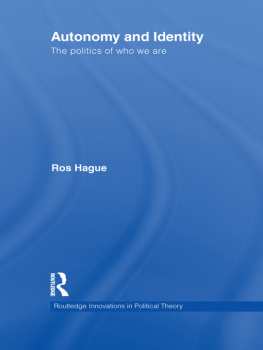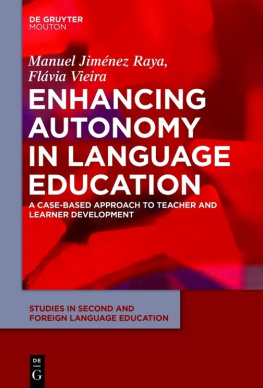THE VOICE OF ADOLESCENTS
AUTONOMY FROM THEIR POINT OF VIEW
GLORIA D. FONDREN, PH.D.

AuthorHouse
1663 Liberty Drive
Bloomington, IN 47403
www.authorhouse.com
Phone: 1-800-839-8640
2013 GLORIA D. FONDREN, PH.D. All rights reserved.
No part of this book may be reproduced, stored in a retrieval system, or transmitted by any means without the written permission of the author.
Published by AuthorHouse 6/20/2013
ISBN: 978-1-4817-6442-1 (sc)
ISBN: 978-1-4817-6443-8 (e)
Library of Congress Control Number: 2013910719
Any people depicted in stock imagery provided by Thinkstock are models,
and such images are being used for illustrative purposes only.
Certain stock imagery Thinkstock.
Because of the dynamic nature of the Internet, any web addresses or links contained in this book may have changed since publication and may no longer be valid. The views expressed in this work are solely those of the author and do not necessarily reflect the views of the publisher, and the publisher hereby disclaims any responsibility for them.
CONTENTS
The purpose of this quantitative study was to examine factors determining adolescents perceptions of ways they develop autonomy. Although research has been conducted on parents beliefs about autonomy development, there is a gap in knowledge on adolescents own beliefs about how they develop autonomy. Furthermore, research is lacking on adolescents beliefs, views, and whether or not their voice and what they have to say is even considered. This research examined whether a relationship exists between adolescents perceptions of parental support, parent adolescent communication, and autonomy development; whether adolescent autonomy development can be predicted by their perception of parental support, parent adolescent communication, and the demographic variables of age and gender; and whether there were ethnic group and gender differences in adolescents perceptions of autonomy development, perception of parental support and parent adolescent communication. The relationship between variables was examined by implementing descriptive statistics, correlations analysis, multiple regression analysis, and MANOVA. Asian, Black, Hispanic, and White participants (n=130), were given the Self Regulation Questionnaire- Academic to measure relative autonomy (RAI), the Perception of Parent Scale to measure parental support, and the Parent Adolescent Communication Scale to measure parent adolescent communication. Results showed that a significant relationship does exist between adolescent perception of parental support, parent adolescent communication, and autonomy development. Race was found to be significantly related to RAI scores. Multiple regression analysis showed that age and gender accounted for only 1% variation in RAI scores. Findings from this study may promote social change by aiding professionals in developing culturally sensitive programs on adolescent development from the adolescents point of view.
Sincere and very special thanks to my family for their patience and support. I am truly grateful for their love and understanding.
Parents play a vital role in adolescents development. Yet, parents cannot be present to guide their behavior at all times, particularly when adolescents are outside the home. Parents must then rely on adolescents to inform them of situations they are faced with such as experiences with peers and friends, academic motivation, or lack thereof, and other personal feelings and thoughts.
If given the opportunity, adolescents are able to communicate and express their views on a variety of topics.
Essentially, they should have an opinion on matters that affect their optimal growth and development. If adolescents are able to share their experiences and personal views with parents, it could enhance autonomy development. On the other hand, if no one is willing to hear what adolescents have to say and they are not able to talk openly with parents, this could have a negative impact on their ability to develop autonomy.
Introduction
According to the self-determination theory, people from all cultures share a basic psychological need for autonomy (Ryan & Deci, 2000). Adolescents are faced with critical challenges to develop autonomy and a coherent sense of self. Some of these challenges are developing individuation (Bandura, 2001), developing and maintaining friendships, and managing peer influence (Hallstrom, 2004; Kittmer, 2005). Additional challenges are risk-taking decisions, adherence to rules, dealing with familial situations, and maintaining academic performance (Low & Stocker, 2002; Vansteenkiste, Zhou, Lens, & Soenens, 2004). These challenges tap into adolescents ability to control and regulate their own behavior while striving to master the environment. Despite the fact that adolescents are able to report on ways they handle these challenges, research exploring how they learn to manage these tasks has been largely unexplored (Chapman, Wall, & Barth, 2004; Garth & Aroni, 2003). Related research has focused on parents beliefs about what they contribute to their adolescents independence rather than adolescents own beliefs (Bumpus, Crouter, & McHale, 2001). Adolescents voice and input on factors influencing how they learn and thereby contributing to their development is important and they should have an opportunity to express their views.
Parents play a vital role in adolescents development. Parents cannot be present to guide their behavior at all times, particularly when adolescents are outside the home. Parents must then rely on adolescents to inform them of situations they are faced with such as experiences with peers and friends, academic motivation, or lack thereof, and feelings about social relationships (dAilly, 2003). Adolescents are a valuable source of information (Garth & Aroni, 2003; Yamato, 1993). They have rights to opinions and personal beliefs (Melton, 1996). Adolescents are able to communicate and express their opinions and ideas on a variety of topics (Garbarino & Scott, 1992; Hojat, 1997; Stepp, 2000). If adolescents are able to share their experiences and personal views with parents, it could enhance autonomy development and prove beneficial in decision making for the entire family (Melton, 1996). On the other hand, if no one is willing to hear what adolescents have to say and they are not given the opportunity to share their experiences and talk openly with parents this could impact negatively on autonomy development.
The purpose of this study was to explore factors determining adolescents perceptions of ways they develop autonomy. Factors explored in this study include parental support and expression of views through communication. Views include personal opinions, having voice, sharing life experiences, ideas, and input into family decision making (Bronfenbrenner, 1995; Bumpus et al., 2001; Harter, Waters, Whitesell, & Kastelic, 1998; Hojat, 1997; Melton, 1996; Satir & Whitaker, 2000). For the purpose of this study, parents include the adolescents natural parents, adoptive parents, stepparents, and legal guardians. It is hypothesized that a positive correlation exists between adolescent perception about parental support, communication, and autonomy development.
Parents perceived by adolescents as supportive and less controlling enhance autonomy development. Parents who are viewed by adolescents as non-supportive and over controlling hinder autonomy development (Caprara et al., 1998; Levesque, Zuehlke, Stanek, & Ryan, 2004; Ryan & Deci, 2000). In addition, parents who provide opportunities and encourage adolescents to communicate their views enhance autonomy (Chapman et al., 2004). Researchers Fincham, Beach, Arias, and Brody (1998) suggested that parents who restrict adolescents expression of views hinder autonomy development.
Next page










